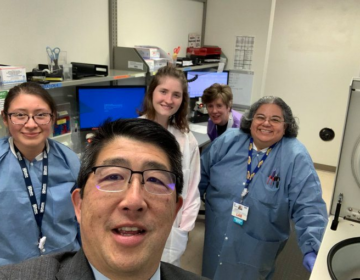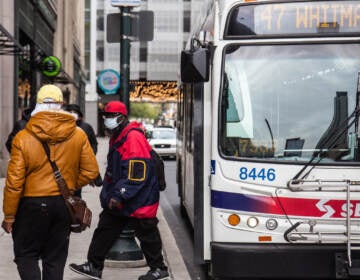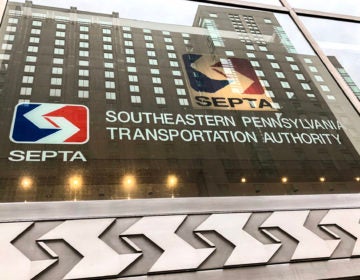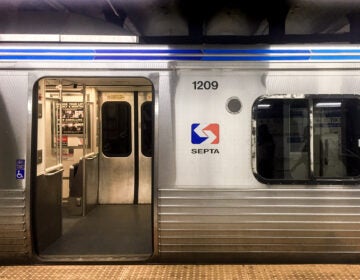SEPTA union cancels ‘job action’ as negotiations continue over coronavirus protections
A union action could significantly disrupt transit service on Thursday. SEPTA employees are demanding coronavirus victim benefits and increased safety measures.

A SEPTA bus driver wears a protective mask as he drives through Philadelphia, Wednesday, April 1, 2020. (AP Photo/Matt Rourke)
Are you on the front lines of the coronavirus? Help us report on the pandemic.
The union that represents SEPTA employees has canceled a planned “job action” that threatened to disrupt the city’s transit system Thursday.
Transport Workers Union Local 234 President Willie Brown said Wednesday that he would hold off on the action as SEPTA and the union continue negotiations over safety protections for drivers and other employees working on the front lines of the coronavirus pandemic.
Mayor Jim Kenney called Brown Wednesday “to ask TWU to not go through with the walkout as it would jeopardize many lives,” said Kelly Cofrancisco, a spokesperson for the mayor.
“Mayor Kenney appreciates TWU for hearing his concerns. Healthcare workers and other essential staff are relying on SEPTA more than ever and it’s critical that we work together to ensure public transportation is accessible to those who need it,” Cofrancisco said.
As coronavirus cases surpass 10,000 in the city, with nearly 200 among SEPTA employees, Brown says SEPTA is moving too slowly when it comes to implementing protective measures.
“It’s almost as if they’re sending my members out there on a suicide mission,” said Brown, who posted an online video warning that the union would take the “job action” Thursday if SEPTA failed to meet demands. “We will choose life over death,” Brown said in the video.
Four SEPTA workers have so far died of coronavirus.
The union has issued a list of demands that includes new rider limits, paid quarantine leave for certain at-risk employees and a $500,000 death benefit for all workers who die as a result of the coronavirus. New York transit workers won the $500,000 death benefit for coronavirus victims last week.
SEPTA has yet to address the specific demands, but officials say they’ve “worked closely with its workforce and union leadership to enhance health and safety protections for our customers and employees.”
Brown and SEPTA general manager Leslie Richards met in early April as part of an ongoing dialogue to address worker concerns.
“We’re hopeful and confident things will go much better and much safer going forward,” Joe Coccio, secretary-treasurer for the union, said. And days later, Brown said SEPTA “started out too slow,” but “we have been seeing changes.”
Now, weeks later, Brown says that the union remains dissatisfied.
“She told us she’d work on some things, but the most serious things, no one is working on,” said Brown.
He accused SEPTA officials of being out of touch and having little empathy for the workforce since they work from home while workers are out on the front lines.
“This virus is happening to us, not them,” said Brown. “So they’re not taking this thing seriously.”
Brown pointed to overcrowding on buses due to an insufficient number of vehicles on routes. SEPTA switched to a Lifeline service, which cut bus and trolley service by about 50%.
“This is not about us, this is about the riding public, also,” said Brown. “You shouldn’t feel like you’re getting on a vehicle that’s not safe for you.”
SEPTA spokesperson Andrew Busch said last week the authority would begin running more buses to address this issue.
“That’s an ongoing challenge,” said Busch. “But we are trying to encourage riders to spread out on buses.”
Brown also said that after “raising Cain” with SEPTA officials last week, the authority finally agreed to step up its deep cleaning effort on vehicles from every 14 days to every 10 days.
SEPTA confirmed last Wednesday the most recent death, Michael Hill, a Regional Rail conductor who worked at the agency for more than 30 years.
The union’s full list of demands include:
-Require temperature screening for all employees upon entering the premises. Anyone testing 100.4 degrees or higher to be sent home with pay.
-Establish transparency in contact tracing for anyone exposed to individuals who show symptoms (i.e. fever, cough or shortness of breath) or test positive for the virus.
-Enforce public health distancing guidelines by scheduling maintenance employees to four days on and three days off, at full pay.
-Conduct daily air quality testing on all vehicles prior to being placed in revenue service.
-To ensure required social distancing, limit to fifteen the number of riders permitted to board SEPTA vehicles and reduce the headway on routes where necessary to accommodate rider demand.
-Quarantine employees with pay who suffer from underlying medical conditions that can lead to death if they contract the virus.
-All deaths of workers as a result of the coronavirus should be deemed to have suffered a work-related injury, entitling their eligible heirs to workers’ compensation benefits.
-SEPTA should pay the families of all workers who die as a result of the coronavirus the $500,000 death benefit provided for under Section 802 of the labor agreement.
WHYY is your source for fact-based, in-depth journalism and information. As a nonprofit organization, we rely on financial support from readers like you. Please give today.





![CoronavirusPandemic_1024x512[1]](https://whyy.org/wp-content/uploads/2020/03/CoronavirusPandemic_1024x5121-300x150.jpg)



